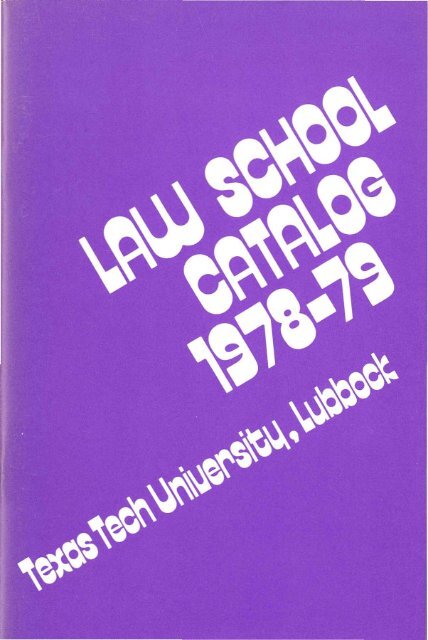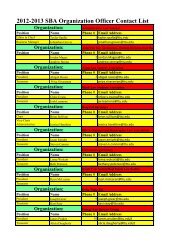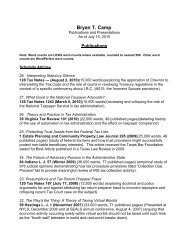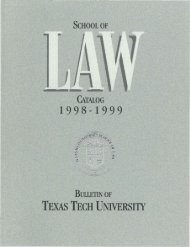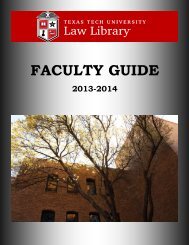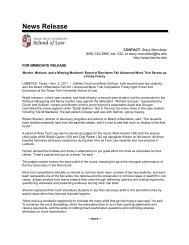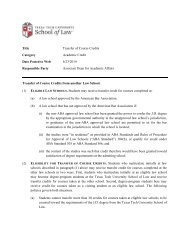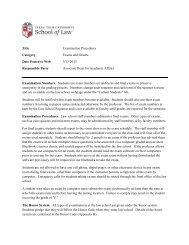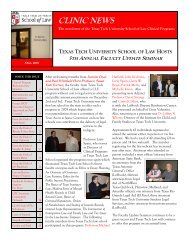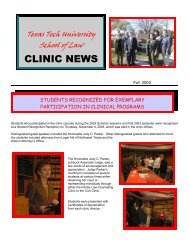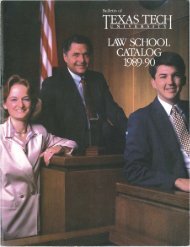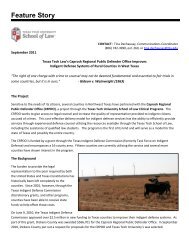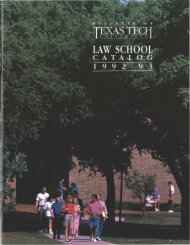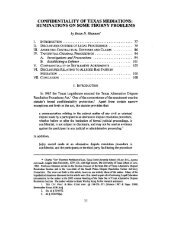1978-1979_Law School Catalog.pdf - The Texas Tech University ...
1978-1979_Law School Catalog.pdf - The Texas Tech University ...
1978-1979_Law School Catalog.pdf - The Texas Tech University ...
- No tags were found...
Create successful ePaper yourself
Turn your PDF publications into a flip-book with our unique Google optimized e-Paper software.
ContentsDirectory .Board of Regents .Principal Administrative OfficersFaculty of the <strong>School</strong> of <strong>Law</strong> ............•.Distinguished Visiting Professors.StaffTrustees of the <strong>Texas</strong> <strong>Tech</strong> <strong>Law</strong> <strong>School</strong> Foundation.CalendarA Message from the Dean<strong>The</strong> <strong>University</strong> Community ..<strong>The</strong> <strong>School</strong> of <strong>Law</strong> ..<strong>The</strong> <strong>Law</strong> Library .<strong>Texas</strong> <strong>Tech</strong> <strong>Law</strong> <strong>School</strong> FoundationFinancial Assistance .Admission.Prelegal Education ..Requirements for AdmissionAdmission Procedures.Fees.Housing.<strong>The</strong> Curriculum. . .Programs of StudyRelated ActivitiesPlacement.Description of CoursesPrelaw Advisers1012141416242525262929303134363746
DirectoryBoard of RegentsOfficersJUDSON F. WILLIAMS, ChairmanROBERT L. PFLUGER, Vice ChairmanMRS. FREDA PIERCE, SecretaryMembersTerm Expires January 31, <strong>1979</strong>JUDSON F. WILLIAMS.. EI PasoJ. FRED BUCY........ DallasA. J. KEMP, JR....... ... Fort Worth.. Te'r~ ~~'i~es I~~~;; 31: 1961ROBERT L. PFLUGER.CHARLES G. SCRUGGSDON R. WORKMAN .. T~r~'Ex'pi~~J~~~~ry31', '1983 .ROYK,FURR .CLINT FORMBY .JAMES L. SNYDER..... San Angelo.. DallasLubbockLubbockHerefordBairdPrincipal Administrative OfficersCECIL MACKEY, Ph.D., PresidentCHARLES S. HARDWICK, Ph.D., Vice President for Academic AffairsKENNETH W. THOMPSON, M.A., Vice President for AdministrationCLYDE E. KELSEY, JR.. Ph.D.. Vice President for Development and <strong>University</strong>RelationsRICHARD A. LOCKWOOD, M.D., Vice President for the Health SciencesCentersGLENN E. BARNETT, Ed.D., Vice President for PlanningJ, KNOX JONES, JR., Ph.D., Vice President for Research and GraduateStudiesROBERT H. EWALT, Ph.D.. Vice President for Student AffairsMARILYN E. PHELAN, 1.0.. General CounselFaculty ofthe <strong>School</strong> of <strong>Law</strong>HAL M. BATEMAN, Professor of <strong>Law</strong>, 1972.B.A.. Rice <strong>University</strong>, 1954; J.D" Southern Methodist <strong>University</strong>, 1956. Admittedto practice in Missouri and <strong>Texas</strong>.DANIEL H. BENSON, Associate Professor of <strong>Law</strong>, 1973.B.A., <strong>University</strong> of <strong>Texas</strong>, 1958; J.D" 1961; M.A., <strong>Texas</strong> <strong>Tech</strong> <strong>University</strong>,1974. Admitted to practice in the District of Columbia and <strong>Texas</strong>.WILLIAM B. BOHLING Associate Professor of <strong>Law</strong>, 1973.B.S.E.E., <strong>University</strong> o'f Utah, 1965; J.D.. 1968; M.A., <strong>Texas</strong> Tec~ <strong>University</strong>,1977; LL.M., <strong>University</strong> of Michigan, <strong>1978</strong>. Admitted to practIce in Utah.JAMES W. BOWERS, Associate Professor of <strong>Law</strong>, <strong>1978</strong>.B.A., Yale <strong>University</strong>, 1964; LL.B., 1967. Admitted to practice in Minnesota.CHARLES P. BUBANY. Professor of <strong>Law</strong>, 1971.B.A., Saint Ambrose College, 1962; J.D., Washington <strong>University</strong>, 1965.Admitted to practice in Missouri.DAVID C. CUMMINS, Professor of <strong>Law</strong>, 1970.B.S., <strong>University</strong> of Idaho, 1957; J.D., <strong>University</strong> of Washington, 1960; LL.M.,New York <strong>University</strong>, 1969. Admitted to practice in Washington.ROBERT P. DAVIDOW, Professor of <strong>Law</strong>. 1971.B.A.. Dartmouth College, 1959; J.D., <strong>University</strong> of Michigan, 1962; LL.M.,Harvard <strong>University</strong>, 1969. Admitted to practice in Florida, Ohio, and<strong>Texas</strong>.J. HADLEY EDGAR,JR., Professor of <strong>Law</strong>,1971.B.A., <strong>Texas</strong> A&M, 1949; J.D., <strong>University</strong> of <strong>Texas</strong>, 1956. Admitted to practicein<strong>Texas</strong>JAMES R. EISSINGER, Professor of <strong>Law</strong>, 1972,B.A., Wartburg College, 1960; J.D., <strong>University</strong> of North Dakota, 1964. Admittedto practice in North Dakota and <strong>Texas</strong>.FRANK W. ELLIOTT, Dean of the <strong>School</strong> of <strong>Law</strong> and professor of <strong>Law</strong>, 1977.B.A., <strong>University</strong> of <strong>Texas</strong>, 1951; LL.B., 1957, Admitted to practice in <strong>Texas</strong>.RICHARD W. HEMINGWAY, Horn Professor of <strong>Law</strong>, 1968.B.S., <strong>University</strong> of Colorado, 1950; J.D., Southern Methodist <strong>University</strong>,1955; LL.M., <strong>University</strong> of Michigan, 1969. Admitted to practice in <strong>Texas</strong>.DONALD M. HUNT, Adjunct Assistant professor of <strong>Law</strong>, 1976.B.A., McMurry College, 1956; LL.B., <strong>University</strong> of <strong>Texas</strong>, 1961. Admittedto practice in <strong>Texas</strong>.J. MICHAEL IRISH, Assistant Dean and Lecturer in <strong>Law</strong>, 1977.B.B.A., <strong>Texas</strong> <strong>Tech</strong> <strong>University</strong>, 1969; J.D., 1972. Admitted to practice in<strong>Texas</strong>.U. V. JONES, Professor of <strong>Law</strong>, 1966.B.A., <strong>University</strong> of Oklahoma, 1939; LL.B.. 1941; M.L.L.. <strong>University</strong> ofWashington, 1962. Admitted to practice in Oklahoma.·JOHN E. KRAHMER, Professor of <strong>Law</strong>, 1971.B.A., <strong>University</strong> of Iowa, 1965; J.D., 1966; LL.M., Harvard <strong>University</strong>, 1967.Admitted to practice in Iowa.BRUCE M. KRAMER, Associate Professor of <strong>Law</strong>, 1974.B.A., <strong>University</strong> of California at Los Angeles, 1968; J.D., 1972; LL.M., <strong>University</strong>of Illinois, 1975. Admitted to practice in California."MURL A. LARKIN, Professor of <strong>Law</strong>, 1968.LL.B., Southeastern <strong>University</strong>, 1939. Admitted to practice in the District ofColumbia and <strong>Texas</strong>.DELLAS W. LEE, Professor of <strong>Law</strong>, 1974.LL.B.. <strong>University</strong> of British Columbia, 1959; LL.M., <strong>University</strong> of Illinois,1962; S.J.D., <strong>University</strong> of Michigan, 1969. Admitted to practice inBritish Columbia.CECIL MACKEY, President of <strong>Texas</strong> <strong>Tech</strong> <strong>University</strong> and Professor of <strong>Law</strong>,1976.B.A., <strong>University</strong> of Alabama, 1949: M.A., 1953: Ph.D., <strong>University</strong> of Illinois,1955; LL.B" <strong>University</strong> of Alabama, 1958. Admitted 10 practice in Ala~bama.ANNETTE W. MARPLE, Assistant Dean and Associate Professor of <strong>Law</strong>,1973.A.B.. <strong>University</strong> of Rochester, 1949: M.A., <strong>University</strong> of Illinois, 1953; J.D.,<strong>Texas</strong> <strong>Tech</strong> <strong>University</strong>, 1973. Admitted to prtlctice in <strong>Texas</strong>.RICHARD W, MAXWELL, Assistant Professor of <strong>Law</strong>, 1975.B.A., West <strong>Texas</strong> Stale <strong>University</strong>, 1954; J.D., <strong>Texas</strong> <strong>Tech</strong> <strong>University</strong>, 1970.Admitted to practice in <strong>Texas</strong>.JANE G. OLM, <strong>Law</strong> Librarian, 1975.B.B.A., <strong>University</strong> of New Mexico, 1948; M.L.S.. <strong>University</strong> of <strong>Texas</strong>, 1966.MARILYN E. PHELAN, General Counsel of <strong>Texas</strong> <strong>Tech</strong> <strong>University</strong> andProfessor of <strong>Law</strong>, 1974.B.A.. <strong>Texas</strong> <strong>Tech</strong> <strong>University</strong>, 1959; M.B.A., 1967; D.B.A., 1971; J.D" <strong>University</strong>of<strong>Texas</strong>,1972. Admitted to practice in <strong>Texas</strong>.·OnleaveSpring<strong>1979</strong>.··On leave <strong>1978</strong>·79.
W. REED QUILLIAM, JR, Professor of <strong>Law</strong>, 1969.B.A., <strong>University</strong> of <strong>Texas</strong>, 1949; B.B.A., 1951; J.D., 1953; LL.M.. HalVard<strong>University</strong>, 1969. Admitted to practice in <strong>Texas</strong>.PAUL D. REYNOLDS, Assistant Professor of <strong>Law</strong>, 1977.B.A., Trinity College (Dublin), 1976; LL.B., 1976; LL.M., Columbia <strong>University</strong>,1977.RODRlC B. SCHOEN, Professor of <strong>Law</strong>, 1971.B.A., <strong>University</strong> of Colorado, 1956; J.D., <strong>University</strong> of New Mexico, 1966.Admitted to practice in New Mexico and <strong>Texas</strong>.FRANK F. SKILLERN, Professor of <strong>Law</strong>, 1971.A.B., <strong>University</strong> of Chicago, 1964; J.D., <strong>University</strong> of Denver, 1966; LL.M.,<strong>University</strong> of Michigan, 1969. Admitted to practice in Colorado.ROBERT A. WENINGER, Associate Professor of <strong>Law</strong>, 1974.B.B.A .. <strong>University</strong> of Wisconsin, 1955; LL.B., 1960; LL.M., <strong>University</strong> ofChicago, 1964. Admitted to practice in California and Wisconsin.JEREMY C. WICKER, Professor of <strong>Law</strong>, 1972.B.E.E., Georgia Institute of <strong>Tech</strong>nology, 1965; J.D., <strong>University</strong> of Houston,1970; LL.M.. Yale <strong>University</strong>, 1972. Admitted to practice in <strong>Texas</strong>.ROBERT E. WOOD, JR., Assistant Professor of <strong>Law</strong>, 1976.B.A., <strong>Texas</strong> <strong>Tech</strong> <strong>University</strong>, 1965; J.D., Vanderbilt <strong>University</strong>, 1968.Admitted to practice in Florida and <strong>Texas</strong>.Distinguished Visiting Professorsw. RAY FORRESTER, Dean and Professor. Cornell <strong>Law</strong> <strong>School</strong>, Summer, 1968.FRANK E. MALONEY, professor, <strong>University</strong> of Florida <strong>Law</strong> Center. Summer,1971.RICHARD C. MAXWELL, Professor, <strong>University</strong> of California al Los Angeles,Summer,1975.EUGENE F. SCOLES, Professor, <strong>University</strong> of Oregon <strong>School</strong> of <strong>Law</strong>, Summer,1977.DON W. SEARS, Professor, <strong>University</strong> of Colorado <strong>School</strong> of <strong>Law</strong>, Summer,1976.FRANK R. STRONG, cary C. Boshamer Distinguished Professor, <strong>University</strong> ofNorth carolina <strong>School</strong> of <strong>Law</strong>, Summer, 1973.ALLAN D. VESTAL, calVer professor, <strong>University</strong> of Iowa College of <strong>Law</strong>,Summer,1974.JOHN W. WADE, Dean and Professor, Vanderbilt <strong>University</strong> <strong>School</strong> of <strong>Law</strong>,Summer, 1969.StaffANN BURBRlDGE, B.A., Registrar.SANDY McDONALD, Administrative Assistant.LOUISE COVINGTON, B.A.. M.L.S., Acquisitions Librarian.JANE STUART, B.A.. M.L.S.. <strong>Catalog</strong>ing Librarian.Trustees of the <strong>Texas</strong> <strong>Tech</strong><strong>Law</strong> <strong>School</strong> FoundationALVIN R. ALLISON, Esq., PresidentMARION KEY, Esq., Executive Vice PresidentDean FRANK W. ELLIOIT, Secretary-TreasurerJOHN RUSSELL CREWS, Esq., Asst. Secretory-TreasurerGEO. W. DUPREE, Esq., Founding President (1890-1973JDr. CLIFFORD B. JONES (1886-1972)W. B. BROWDER, JR., Esq.Honorable FRANK W. CALHOUNRAdm. D. D. CHAPMAN, USN (Ret.)E. R. FINNEY, Esq.Dr. GROVER E. MURRAYG. Ii. NELSON, Esq.<strong>1978</strong>August 24August 28November 22-26December 12December 15December 13-22<strong>1979</strong>January 8March 17-25April 27April 3D-May 11May 29August 23Calendar<strong>1978</strong>-<strong>1979</strong>PAUL NEW, Esq.ROBERT SCOGIN, Esq.W. O. SHAFER, Esq.GARLAND SMITH, Esq.Honorable TRUETT SMITHHonorable WILLIAM E. WARDRegistration for fall semester.Instruction commences.Thanksgiving recess.Last day of classes for advanced students.Last day of classes for first year students.Examinations.Instruction oommences for spring semester.Spring recess.Last day of classes.Examinations.Summer session commences.Registration for fall semester.
A Message From the Dean<strong>The</strong> <strong>School</strong> of <strong>Law</strong> at <strong>Texas</strong> <strong>Tech</strong> completed its first decade ofoperation having accumulated many assets. <strong>The</strong> physical radii·ties are second to none in the country, whether considered froman aesthetic or a functional viewpoint. <strong>The</strong> library provides thetools for research of the law, learning the law, and practicinglaw. However, the most important assets of any school are peopleand their ideas.<strong>The</strong> people who contribute so much to the law school includethe Board of Regents. the <strong>University</strong> administration, the facultyand staff of the law school itself, the growing number of loyalalumni, and the students. <strong>The</strong> support of the Regents and the administration,including President Mackey, who is a member ofthe law faculty, could not be greater. <strong>The</strong> faculty has been chosenfor their ability to teach and relate to students, but excellentteaching is not their only virtue. Scholarly research and publication,both oral and written; preparation of new developments inlegislation; representation of indigents; consultation with practicingattorneys; participation in bar committees and other activities;and faculty work within the <strong>University</strong> community areamong their other contributions ofgreat importance. <strong>The</strong> increasingnumber of alumni are demonstrating in the best way possible--theirperformance as lawyers--that this is a first-classschool. Although mentioned last, the students are obviously notthe last in importance. An intelligent, inquisitive, participatingstudent body contributes to its own learning process, and thoseattributes are increasingly visible in each year's entering class.<strong>The</strong> basic concept that will continue to govern the law schoolin future decades is that its purpose is to prepare students tofunction as lawyers. Many other things are learned, and shouldbe learned, in law school. but if a graduate cannot function as alawyer, his or her time has been wasted. If you want to enjoyyour legal education, to contribute to it by your own hard work,and to graduate capable of entering the practice of law confidentof your ability, then we want you as a student at <strong>Texas</strong> <strong>Tech</strong>.Frank W. Elliott
<strong>Texas</strong> <strong>Tech</strong> first opened its doors in the fall of 1925 with sixbuildings and an enrollment of 910 students. Because of itsunique location in the fertile South Plains and because it wasquick to assume a leading role among schools in the Southwest,the institution has prospered and grown and can now lay claimto being a major university with demonstrated strength in thearts, humanities. and sciences. It contains six instructional colleges---AgriculturaJSciences, Arts and Sciences, Business Adminislration,Education, Engineering, Home Economics--and aGraduate <strong>School</strong>, in addition to the <strong>School</strong> of <strong>Law</strong>. It functionsas do its counterparts in Austin, College Station, and Houstonunder the guidance of the Coordinating Board, <strong>Texas</strong> College and<strong>University</strong> System.<strong>The</strong> <strong>Texas</strong> <strong>Tech</strong> <strong>University</strong> <strong>School</strong> of Medicine, a separate institution,was authorized by the legislature, and the legislationwas signed by the governor on May 27, 1969. <strong>The</strong> first studentswere admitted in the fall of 1972.Since it was established over forty years ago, <strong>Texas</strong> <strong>Tech</strong> hasgrown to an institution with a student body of over 22,000 and aresident faculty drawn from all parts of the world. Many specialfacilities for interdisciplinary research are at hand, such as thecomputer center, the Southwest Collection, and the library's expandingcollection of material in the general areas of the humanities.<strong>The</strong> <strong>University</strong>'s most recent interest in research isreflected in its International Center for Arid and Semi-Arid LandStudies which focuses the contributions of various academic disciplineson problems of these large segments of the earth's sur·face.<strong>Texas</strong> <strong>Tech</strong> is located in Lubbock, a city of nearly 180,000 population,the commercial and financial "hub" of the prosperousSouth Plains region of <strong>Texas</strong>. <strong>The</strong> city offers an unusually finevariety of cultural opportunities and, at an altitude of 3,250 feet,has a dry and invigorating climate.11<strong>The</strong> <strong>University</strong> Community
<strong>The</strong> <strong>School</strong> of <strong>Law</strong>In 1963 the Board of Directors of <strong>Texas</strong> <strong>Tech</strong> provided for theaddition of a <strong>School</strong> of <strong>Law</strong>. Subsequently, this action was approvedby the Coordinating Board, <strong>Texas</strong> College and <strong>University</strong>System.Instruction commenced in the fall of 1967 with a first yearclass. In subsequent years, the school has seen its first graduatesand the broadening of its curriculum to reflect the <strong>University</strong>'scommitment to excellence in legal education. Graduates of the<strong>School</strong> of <strong>Law</strong> receive the J.D. {Doctor of Jurisprudence} degree.<strong>The</strong> <strong>School</strong> of <strong>Law</strong> is fully accredited. Final approval by theSupreme Court of <strong>Texas</strong> under the Rules Governing Admissionto the Bar of <strong>Texas</strong> was granted in 1968. <strong>The</strong> school met the re·quirements for final approval by the American Bar Associationat the earliest date possible and that approval was formally con·ferred at the annual meeting in August. 1970. As a result, graduatesof the <strong>School</strong> of <strong>Law</strong> are qualified to apply for admission topractice in most states in the United States.<strong>The</strong> faculty maintains an active interest and participation inthe affairs of the Association of American <strong>Law</strong> <strong>School</strong>s, and applicationfor institutional membership in that organization wasacted upon favorably at the annual meeting of the association inDecember, 1969.<strong>The</strong> objective of the faculty of the <strong>School</strong> of <strong>Law</strong> is to trainyoung men and women for the practice of law anywhere in theUnited States, whether it be as advocate, counselor. judge. orlaw teacher, in accordance with the highest traditions of professionalresponsibility. At Ihe same time recognition is given 10 theuse of law as a stepping·stone to a career in government, politics,or business. <strong>The</strong> curriculum and the methods of instruction aredesigned to develop in the students their highest potential.whatever may have been their reasons for entering the school.<strong>Texas</strong> <strong>Tech</strong> <strong>University</strong> does not discriminate on the basis ofrace. sex, color. religion, creed, national origin, or handicap in itseducational programs, admissions policies, employment, or other<strong>University</strong>-administered programs. Any inquiries or complaintspursuant to Title IX or Section 504 of the Rehabilitation Act of1973 should be directed to Dr. Robert H. Ewalt at the Office ofStudent Affairs, 213 Administration Building, telephone (806)742·2131.Handicapped students attending the <strong>School</strong> of <strong>Law</strong> will findnumerous barrier-free facilities. <strong>The</strong> entrance is free of steps andall floors to the classrooms and library are serviced by elevators.Special programs designed to improve the services available tophysically handicapped and visually impaired students aredirected within the Office of Student Life.13
14State offices of the Commission for the Blind and the <strong>Texas</strong>Rehabilitation Commission are located on the <strong>Texas</strong> <strong>Tech</strong>campus.<strong>The</strong> <strong>Law</strong> LibraryAn essential ingredient of the study of law is learning bydoing; hence, no law school can aspire to a position of excel·lence without an outstanding library. A law school's libraryfacilities have been equated to the laboratory facilities associatedwith the physical sciences.For maximum use by the student body, the library is openover one hundred hours per week. Multiple copies of selectmonographs, treatises, and reports are available so that numerousstudents may study the same problem at the same time.In general, the present collection of over 125,000 volumes maybe divided into three basic categories: (1) Sources of the law,including case reports, federal and state statutes, and administrativedecisions and regulations; (2) Research aids, such as digests,encyclopedias, and indexes; (3) Commentaries on the law,including treatises and legal periodicals.<strong>The</strong> <strong>School</strong> of <strong>Law</strong> currently is subscribing to more than 1,025periodicals. Complete sets of over 300 are on the shelves. <strong>The</strong>library has many loose-leaf services of interest to students andpractitioners alike and is expanding its holdings in such areasas poverty, consumer protection, and environmental law. <strong>The</strong>school's law library is the principal repository for legal materialswithin a radius of more than 300 miles.In addition, the main <strong>University</strong> library, a government depository,contains a substantial number of legal documents and othermaterials closely related to law which are available to studentsin the <strong>School</strong> of <strong>Law</strong> as a supplement to the law library.<strong>Texas</strong> <strong>Tech</strong> <strong>Law</strong> <strong>School</strong> FoundationIncorporated on October 16, 1967, the <strong>Law</strong> <strong>School</strong> Foundationwas conceived as a vehicle for expanding the law schoof'scontribution to the life of the profession and the community. Inestablishing the foundation as a non-profit entity, its sponsorsenvisioned the foundation as a device to develop the school'sfull I?otential, especially in the years immediately follOWing itsCreatIon. Just as the Bar has long realized its obligation as a communityleader, the <strong>School</strong> of <strong>Law</strong> must assume its obligationsboth within and without the university community. It is anticipatedthat the school's response to this challenge will justify theexpectations of those who are at work making the <strong>Law</strong> <strong>School</strong>Foundation a viable force.Annual Giving Program<strong>The</strong> Foundation conducts an annual Giving Program throughwhich alumni and friends of the <strong>School</strong> of <strong>Law</strong> may contribute toprograms of support undertaken by the Foundation. Areas ofsupport by the Foundation include the scholarship and loan programs,moot court, law review, alumni and bar relations, continuinglegal education, and faculty recruitment. Contributorsto the program are designated Sustaining Members of the Foundationand. when appropriate. Scholarship Donors or membersof the Dean's Council.Fellows of the FoundationWithin the Foundation, attorneys and others who have madea major commitment to aid the school in achieving excellencehave become Fellows of the Foundation. <strong>The</strong> revenues from theircontributions are utili7.ed as needed to enrich the law schoolexperience beyond those activities supported by state funds.<strong>Law</strong> Review AssociationRecently added to the Foundation is the <strong>Texas</strong> <strong>Tech</strong> <strong>Law</strong> ReviewAssociation comprised of fanner staff members of the LowReview in good standing at the time of their graduation. <strong>The</strong>Association was organized to promote legal scholarship throughservice on the <strong>Texas</strong> <strong>Tech</strong> Low Review, encourage continuedinterest and support from fanner staff members, and providefinancial support for the regular activities and special projects ofthe <strong>Law</strong> Review.15
16Financial Assistance. Scholarships, loans, and a limited number of part-lime posilionsare available in the <strong>School</strong> of <strong>Law</strong> and in the <strong>University</strong>.Awards of financial assistance are made on the basis of academicpromise and financial need.Scholarship application forms are available from the <strong>School</strong> of<strong>Law</strong>. In the case of entering students. completed forms should be~turn.ed to the <strong>School</strong> of <strong>Law</strong> no later than March 15 of the year10 which the student intends to enter, in order to receive fullestconsideration for all available scholarships. Applications formost grants are oonsidered by the Scholarship Committee inJuly, at which time the committee can inform itself of the applicant'sperformance during the preceding academic year.Loans<strong>Texas</strong> <strong>Tech</strong> <strong>University</strong> administers numerous student loanfun~s upon which students may draw for assistance in payingtheir college related expenses, including loan funds availablesolely to law students. To receive full consideration for all programsfor which a student may be eligible. applications shouldbe returned no later than April 15 for the following fall semester.Additional information regarding any of the <strong>University</strong> loanfunds may be obtained by writing to Director of Student FinancialAid, <strong>Texas</strong> <strong>Tech</strong> <strong>University</strong>. P.O. Box 4179, Lubbock. <strong>Texas</strong>79409.ScholarshipsALVIN R. ALLISON SCHOLARSHIFL--A scholarship grant of $250established by Mr. Allison, attorney from Levelland, formermember ~f the Board .of Directors of <strong>Texas</strong> <strong>Tech</strong> and guidingforce behmd the creation of the <strong>School</strong> of <strong>Law</strong>. It is awardedannually to a deserving entering or advanced student.ALUMNI SCHOLARSHIF'-One or more scholarships, to bea~arded annu.ally to deserving students, made possible throughglf.ts by alumni of the <strong>School</strong> of <strong>Law</strong> to the Participating ScholarshipDonor Program of the Foundation.ROGER '(. BA1.-nS:-ONI SCHOLARSHIPS-Two scholarship grantsfor deserv~ng mmonty students in need of financial assistance.DUR:VV00D H. BRA0U:Y SCHOLARSHIP-Mrs. DurwoodH. Bradleyand friends and relatives have endowed these scholarships inmemory of Mr. Bradley, who was a prominent Lubbock attorneyfor many years. <strong>The</strong> scholarships are awarded to deservingstudents.C. H. AND JANET RILEY BROCKETT SCHOLARSHlP--An annualschol~rship of $500 to be awarded to a deserving first year student10 need of financial assistance.R. GUY CARTER SCHOLARSHIP--A scholarship grant of $500 donatedannually by R. Guy Carter, Esq., of the Dallas firm ofCarter, Jones, Magee, Rudberg, Moss & Mayes to an outstandingentering law student.WILLIAM C. CLARK SCHOLARSHiPS-Mrs. J. C. Clark and DavidG. Clark have endowed these scholarships in memory of theirson and brother, a Lubbock attorney and a member of the Classof 1942 of <strong>Texas</strong> <strong>Tech</strong>. <strong>The</strong> scholarships are awarded to deservingsecond or third year students.CRENSHAW, DUPREE & MIl.AM SCHOLARSHIP-An annual scholarshipof $500 contributed by the law firm of Crenshaw, Dupree& Milam of Lubbock, to be awarded 10 a worthy recipient in anyclass.SANDRA ALLISON DAVIS SCHOLARSHlP--A scholarship grantof $250 in honor of Mrs. Davis, a Levelland attorney, awardedannually 10 a deserving student in the second or third yearclass.J. J. DILLARD SCHOLARSHIPs-Bryan B. Dillard. a Lubbock attorney,has established two $500 scholarships in memory of hisfather, J. J. Dillard, who became a Lubbock resident near the turnof the century and practiced law here for a number of years.<strong>The</strong>y are awarded to deserving students.EL PASO BAR AUXILIARY SCHOLARSHIP--A scholarship grantfrom the Auxiliary to aid a deserving law student from El Paso.FACULTY SCHOLARSHIP--A scholarship provided annually to adeserving student by the faculty of the <strong>School</strong> of <strong>Law</strong>.FULBRIGHT & JAWORSKI SCHOLARSHIPS-Three annual scholarshipsof $150 each by the named Houston law firm to the studentselected as editor of the <strong>Texas</strong> <strong>Tech</strong> <strong>Law</strong> Review and to thestudents who have made the highest scholastic average in thefirst and second year classes.GEARY, STAHL, KOONS, ROHDE & SPENCER MOOT COURTSCHOLARSHIP--A scholarship grant of $300 awarded annually toa student whose outstanding performance in intercollegiate mootcourt competition has brought credit to the law school.GIBSON, OCHSNER & ADKINS SCHOLARSHIP--An annual scholarshipof $500 by the named Amarillo law firm to an outstandingstudent in need of financial assistance.LAWRENCE F. GREEN MEMORIAL SCHOLARSHIP--A scholarshipgrant of $200 established in memory of the late Lubbock attorneyby John F. Maner of Lubbock, to a deserving second or third yearstudent.FRANK K. HARRELL. JR, SCHOLARSHIP-An annual scholarshipof $300 established by Gary Harrell ('73) in memory of his father17
18to be awarded to a deserving second or third year student inneed of financial assistance.JOHN V. HA YSLIP SCHOLARSHIP-A scholarship of$300 given byJohn V. Hayslip, <strong>Texas</strong> City and Galveston attorney who is analumnus ('74) of the law school, to be awarded to a deservingstudent.JUDGE E. E. JORDAN SCHOLARSHIP-A scholarship grant of$250 to honor Judge Jordan by an Amarillo donor who wishes toremain anonymous.LIDDELL, SAPP, ZIVLEY & BROWN SCHOLARSHIP-A scholarshipof $1,000 dedicated to the president of the Student Bar Association,presented by the named Houston law firm.LUBBOCK ArrORNEYS' MOOT COURT SCHOLARSHIPS--One ormore scholarship grants made possible annually by gifts fromLubbock attorneys. Early contributors to this scholarship programare Walters and Associates and George E. Gilkerson.LUBBOCK BAR AUXILIARY SCHOLARSHIP--A scholarship grantof $200 to a married student in need of financial assistance.JOE H. NAGY SCHOLARSHIP-A scholarship grant of$400, establishedto honor Lubbock attorney Joe H. Nagy by his wife andchildren, to be awarded annually to a deserving student in needof financial assistance.G. HOBERT AND ArLEEN HACKNEY NELSON SCHOLARSHlp......-Ascholarship grant endowed by the children of Mr. and Mrs. Nel.son to honor their parents, longtime Lubbock residents. It isawarded annually to a deserving second or third year student.W. R. QUILLIAM SCHOLARSHIP--A scholarship grant 0£$300 establishedin memory of the late South <strong>Texas</strong> attorney-geologistby his widow, of Beaumont, and son, of the faculty. It is awardedannually to a deserving student in any class in need of financialassistance.J. W. SANDERS SCHOLARSHIP--A scholarship grantof$250 establishedto honor the Amarillo attorney by his partner, E. R. Finney,to a deserving second or third year student.SCOGGIN-DICKEY SCHOLARSHIPS-Two scholarships in theamount of $500 each to graduates of <strong>Texas</strong> <strong>Tech</strong> <strong>University</strong>, presentedannually by the Scoggin-Dickey Buick Company ofLubbock through the <strong>Texas</strong> <strong>Tech</strong> Ex-Students' Association.CURT F. STEIB, JR., MEMORIAL SCHOLARSHIP--A scholarship inmemory of Curt Steib, Jr., a member of the Class of 1977, endowedby his family, classmates, and friends. It is awarded annuallyto a student in financial need.TEXAS ASSOCIATION OF DEFENSE COUNSEL SCHOLARSHIPS-Two scholarship grants of $250 each by the <strong>Texas</strong> Association ofDefense Counsel to be awarded annually to worthy studentswho, after considering their financial need, pragmatism, andpursuit of knowledge, exhibit a strong interest in the field of trialadvocacy.JOHN E. THOMASON MEMORIAL SCHOLARSHIP-A scholarshipgrant of $250 established to honor the late Midland attorney byhis family and friends. It is to be awarded annually to adeserving second or third year student.THOMPSON, KNICHT, SIMMONS & BULLION SCHOLARSHIPA scholarship grant of $1,250 by the named Dallas law firm to beawarded to a deserving student member or candidate of the<strong>Texas</strong> <strong>Tech</strong> <strong>Law</strong> Review in need of financial assistance.HERB AND MARY WILLS ACADEMIC SCHOLARSHIP-A scholarshipin the amount of $300 established by Donald V. W. Wills('74) in honor of his parents, to be awarded to a deserving secondyear student in the upper ten percent of that class.W. B. FOUNDATION, INC., SCHOLARSHIPs--Grants in varyingamounts established by the named Foundation to be awarded todeserving students.TEXAS TECH LAW SCHOOL FOUNDATION SCHOLARSHIP-Establishedto assist deserving and promising law students whohave completed the first year of law school.19
20TEXAS TECH LAw PARTNERS SCHOLARSHlfL-A scholarship of$130 awarded to a law student in need of financial assistance.FundsALVIN R. AND ALETHA FAYE ALLISON LOAN FUNo-Mr. andMrs. Allison of Levelland have endowed this fund to provideshort-term loans to students in need of financial assistance whilepursuing the study of law.JUDGE DAN BLAIR LOAN FUND--Judge Blair served as DistrictJudge for Lubbock, Hockley, Cochran, and Crosby counties,1936-51. <strong>The</strong>se funds are available to students for short-termloans.CHILDRESS COUNTY FUND--Attorneys from Childress Countyhave established this fund to aid students from their county. <strong>The</strong>fund is composed of sums received by the attorneys for theirservices in representing indigents in the courts of the county.JUDGE MARVIN JONES LOAN FUND--<strong>The</strong> late judge jones, aleader in the establishment of <strong>Texas</strong> <strong>Tech</strong>, a former Congressmanfrom West <strong>Texas</strong>, and former Senior judge on the U.S. Court ofClaims, made funds available for short-term loans to law students.JUDGE E. E,jORDAN LOAN FUND-judge jordan, retired from the47th District Court in Amarillo, has provided a fund for law studentswho find themselves in unanticipated, short-term financialdifficulties.VICTOR H. LINDSEY MEMORIAL FUND-At the suggestion ofMrs. Victor H. Lindsey of Lubbock, widow of judge Victor H.Lindsey, of the 72nd District Court, the Lubbock County BarAssociation and friends of the late judge Lindsey have createdthis fund for loans and other financial assistance to law studentsin need.DREW SIMPSON MEMORIAL FUND-A fund established by thefamily, colleagues, and friends of Drew Simpson ('74) upon hisdeath in February, 1972. Its purpose is to aid students in financialdifficulty.TEXAS TECH LAW REVIEW SCHOLARSHIP AND LOAN FUND-Thisfund, initially established as a loan fund, will eventually increaseto permit the awarding of scholarships. Recipients are limitedto members of the <strong>Texas</strong> <strong>Tech</strong> <strong>Law</strong> Review staff.AwardsCHIEF JUSTICE JAMES P. ALEXANDER AWARD-An award of thefour volume set, McDonald, <strong>Texas</strong> Civil Practice, presented byDean Frank Elliott and Callaghan & Company to the outstand·ing student in <strong>Texas</strong> Procedure for the year. <strong>The</strong> award is inhonor of former Chief Justice James P. Alexander, the father ofprocedural reform in <strong>Texas</strong>.WILLIAM B. BOHLING AWARD-An award of $100 to a studentwho has exhibited high academic achievement and exemplaryclassroom performance in Business Torts and Antitrust. Sheryland Samuel Boyd ('77) have presented this award in honor of hisformer professor.BROWN & BROWN AWARD--An award of $50 to each memberof the Client Counseling Competition team, presented by thenamed Lubbock law firm.CEO. W. AND SARAH H. DUPREE AWARD-An award of$100, endowedby a gift from Mr. and Mrs. Dupree, is presented annuallyto the member of the graduating class who, in the opinion of hisor her colleagues, best exemplifies the ability, integrity, andsense of professional responsibility desired in one soon to jointhe legal profession. ConSideration is given to the academic record,to the leadership abilities, and to the contributions made tothe law school and the community.ENVIRONMENTAL LAW ESSAY AWARD-An award of$100 to thestudent who prepares the best essay in the area of environmentallaw, presented by the Environmental <strong>Law</strong> Section of the Associationof Trial <strong>Law</strong>yers of America.!NTRASCHOOL MOOT COURT AWARDS-Awards totaling $300from the finn of Geary, Stahl, Koons, Rohde & Spencer of Dallasare presented annually to the winning team and the outstandingoralist in the intraschool Moot Court competition.JUDGE MEADE F. GRIFFIN AWARD-An award of $200 fromJudge Griffin's former briefing attorneys presented annually tothe graduating law student who, through industry, perseverance,integrity, and character, has best utilized the law school experienceto prepare for distinguished service to the profession and tomankind.HUGHES, LUCE, HENNESSY, SMITH & CASTLE MOCK TRIALAWARD--An award of $200 to the winning team of the <strong>Texas</strong><strong>Tech</strong> Mock Trial Competition, awarded by the named Dallas lawfirm.DONALD M. HUNT OUTSTANDING BARRISTER AWARD--Anaward of $100 presented by Sheryl and Samuel Boyd ('77). <strong>The</strong>award, named for the advisor to the Board of Barristers, is presentedannually to an outstanding member of a Moot Court orMock Trial competition team.JACKSON, WALKER, WINSTEAD, CANTWELL & MILLER LAW REVIEW AWARD-An award of$100 to a staff member in recognitionof exemplary dedication to the <strong>Law</strong> Review.21
AdmissionPrelegal Education<strong>The</strong> <strong>School</strong> of <strong>Law</strong> does not prescribe a definite prelegal curriculumfor its applicants. <strong>The</strong> wide range of lawyers' tasks andthe difference in offerings from school to school preclude suchan approach. However, there are certain goals which all pre-lawstudents should keep in mind when planning their college programs.<strong>The</strong>y should strive to acquire the ability to read, write,and speak the English language well; 10 gain a critical understandingof human values and institutions-political, economic,and social; Bnd to develop in themselves the power to think creatively.Undergraduate training should result not only in a Quantityof knowledge. but also in an understanding of the basis ofthis knowledge. its degrees and conditions.Two items deserve special mention. Students will find it helpfultohave some preliminary work in accounting as backgroundfor the courses in business entities and taxation. Typing skillswill prove useful not only in the preparation of briefs and memoranda,but also for daily preparation and examinations.Requirements for AdmissionAn applicant must have received, or have completed all requirementsfor, a baccalaureate degree from a college or universityof approved standing prior to the time he or she begins workin the <strong>School</strong> of <strong>Law</strong>. In order to apply, however, an applicantneed have completed only six semesters or nine quarters ofundergraduate work. Additionally, an applicant must take the<strong>Law</strong> <strong>School</strong> Admission Test which is administered five times ayear throughout the United States·and in many foreign countriesby the Educational Testing SeIVic~. An applicant's record mustbe of sufficiently high Quality to demonstrate that he or sheis qualified for the study of law. In evaluating an applicant'srecord, considerable weight is given to undergraduate gradesand the score achieved on the <strong>Law</strong> <strong>School</strong> Admission Test. Inexceptional cases, the work of the last two college years will beweighed more heavily than that of earlier years. To a lesserextent, consideration is given to other factors such as the qualityof the applicant's college, the grade trend, cultural background,work experience during and after college, extracurricular activities,graduate studies, service in the military, Peace Corps, orVista, and the applicant's statement of purpose. Letters of recommendationare not required, but if an applicant wishes to haveletters sent, those from former professors are most helpful.Students are admitted only in the fall e;:cept in special circumstances.<strong>The</strong> <strong>School</strong> of <strong>Law</strong> recommends that students devotetheir entire time to the study of law. Students who are engaged25
26in outside employment must report the quantity of such workper week and may be asked 10 withdraw from the school if theamount of time spent in outside employment is deemed excessiveor appears to interfere with full-lime study of law. Outsideemployment should in no case exceed 15 hours per week.Admission ProceduresAn application form and additional information may be ob.tained by writing toOffice of Admissions<strong>School</strong> of <strong>Law</strong><strong>Texas</strong> <strong>Tech</strong> <strong>University</strong>P.O. Box 4030Lubbock. <strong>Texas</strong> 79409<strong>The</strong> completed application fonn should be returned to the abovead.dress at the earliest opportunity after the beginning of the applicant'ssenior year. <strong>The</strong>re'is no application fee.<strong>The</strong> last date for filing application forms is May 1 for admissionin August, but substantially earlier filing is strongly recommended.Applicants ming after March 1 will be at a oonsiderabledisadvantage in competing for the limited number of placesavailable in the next entering class.Applications for admission to the Master of Business Administrationand Doctor of Jurisprudence joint degree program (describedunder "Programs of Study") should be made to both the<strong>School</strong> of <strong>Law</strong> and the Graduate <strong>School</strong> of <strong>Texas</strong> <strong>Tech</strong> <strong>University</strong>.Applications to the Graduate <strong>School</strong> can be obtained bywriting directly to that school. Applicants must meet the regularadmission requirements of each school and must be acceptedby each to be eligible for the program. If a student is undecidedabout whether to pursue the joint program, application to theGraduate <strong>School</strong> can be delayed until the beginning of the thirdsemester in law school.Students having questions concerning law school admissionpolicies may find the Prelaw Handbook (mentioned in more detailunder "<strong>Law</strong> <strong>School</strong> AdmiSSion Test") generally helpful. Studentswith specific questions should feel free to contact theS.chool of <strong>Law</strong>. Interviews are neither required nor encouragedsince they cannot be granted to all applicants and since decisionsare made by evaluating the application materials on the basis ofspecified criteria. It is suggested that the applicants make theirapplications as complete as possible by submitting all materialsthey think will be helpful to the committee and by supplementingtheir applications as the need arises.Official prelaw advisers on many campuses in <strong>Texas</strong> are listed?t the en.d of this catalog. <strong>The</strong>y should be able to provide muchInformalton of assistance to prelaw students.Transcripts and LSDASA student may have an application considered after completingat least six semesters or nine quarters of undergraduatework. <strong>The</strong> applicant is required to register with the <strong>Law</strong> <strong>School</strong>Data Assembly Service (LSDAS) by rompleting and mailing theregistration form supplied with the Bulletin of Information forthe LSAT. A transcript from each college or university attendedshould then be sent directly to LSDAS. Educational TestingService, Box 944, Princeton, New Jersey 08540. It is not necessary.at this point, to forward transcripts to the <strong>School</strong> of <strong>Law</strong>.<strong>The</strong> LSDAS will analyze the transcripts and forward a reportto the law schools designated on the registration form. It is importantto rerognize that oonsiderable lead time is required for anundergraduate transcript to be processed through LSDAS. Noless than eight weeks should be allowed for this process. Uponadmission. it will be necessary for the student to furnish to the<strong>School</strong> of <strong>Law</strong> one official transcript showing final grades andreceipt of undergraduate degree. If a student has attended morethan one college or university, one official transcript should beforwarded from each institution attended. Before admission.additional transcripts, other than those supplied throughLSDAS. should be submitted to the <strong>School</strong> of <strong>Law</strong> only in responseto a specific request.<strong>Law</strong> <strong>School</strong> Admission Tesl<strong>The</strong> applicant must take the <strong>Law</strong> <strong>School</strong> Admission Test andrequest that the score be reported to the <strong>School</strong> of <strong>Law</strong>. <strong>The</strong> testusually is given in October, December, February, April, and Juneof each year. It is recommended that the applicant take the testno later than February prior to prospective entrance to the<strong>School</strong> of <strong>Law</strong>, and it is strongly recommended that it be takenearlier if at all possible.<strong>The</strong> <strong>Law</strong> <strong>School</strong> Admission Bulletin, which contains informa·tion concerning the lest, sample questions, application forms,and a list of the testing centers may be obtained by applying inperson at the <strong>School</strong> of <strong>Law</strong> or by writing to <strong>Law</strong> <strong>School</strong> AdmissionTest, Educational Testing Service, Princeton, New Jersey08540. A sample of the test, including new types of questions,a discussion of the different types of questions, an analysis ofthe correct answers, and information about test-taking strategiesmay be found in the <strong>Law</strong> <strong>School</strong> Admission Bulletin. No othermaterial is reoommended by the <strong>Law</strong> <strong>School</strong> Admission Coun·cil for study preparation for the LSAT.27
28Good Character<strong>The</strong> <strong>School</strong> of <strong>Law</strong> may deny admission to any applicant who.in the judgment of the faculty. may appear to be unfit in characterto engage in the study or practice of law.Declaration of Intention to Study <strong>Law</strong><strong>The</strong> State Board of <strong>Law</strong> Examiners of <strong>Texas</strong> makes the followingrequirement:Every person intending 10 apply for admission to the Bar of this Stale shallfile with the Secretary of the Board a Declaration of Intention to Study <strong>Law</strong>.Such Declaration shall be filed not more than sixty (60) days prior to normore than one hundred twenty (120) days after enlry into an approved lawschool and, for purposes of uniform administration of this rule, filing deadlinesshall be construed as follows: FaU entrants. January 15; Spring entrants.June I; Summer entrants, October 15; .... Such Declaration shall be madein duplicate on fonns to be prescribed by the Boaed, and shall show suchfacts as to the history, experience. and educational qualifications of thedeclarant as the Board may require. II shall name the law school in whichthe declarant proposes to study. or is studying. which school must be anapproved law schooL<strong>The</strong> forms may be obtained from Mrs. Alta Moore. Box}, CapitolStation, Austin. <strong>Texas</strong> 78711. or in person from the <strong>School</strong> of<strong>Law</strong>.<strong>The</strong> fee required for filing of the Declaration of Intention toStudy <strong>Law</strong> form is $75.Students who expect to practice in other states should investigatepossible similar requirements in such states.Admission with Advanced StandingA student who has studied at another approved law school,and who is eligible to continue there in good standing, may applyfor admission to the <strong>School</strong> of <strong>Law</strong>. If accepted, a transfer studentwill be eligible for advanced standing credit for acceptablework done at the former school. <strong>The</strong> amount of advanced standingcredit for which a student is eligible is determined on an individualbasis. No credit will be granted for courses in whichgrades are below the average required for graduation at theschool from which the student wishes to transfer.<strong>The</strong> applicant for admission as a transfer student should complywith the procedure required for admission to the first yearclass and, in addition, forward a letter stating why he or shedesires to transfer to <strong>Texas</strong> <strong>Tech</strong>.Visiting StudentsStudents who are in good standing at another law school maybe considered for admission to <strong>Texas</strong> <strong>Tech</strong> on a visiting basis. Anapplication for admission must be completed and a letter ofstanding must be furnished from the dean of the law schoolwhich the student is currently attending stating that the studentis in good standing and that credit for courses taken at <strong>Texas</strong><strong>Tech</strong> will be accepted for transfer.FeesTo enable the student to estimate expenses at the time of enteringthe <strong>School</strong> of <strong>Law</strong>, the following infonnation is offered.Shortly after acceptance for admission to the <strong>School</strong> of <strong>Law</strong>.each student must forward a $50 acceptance deposit, which willbe applied toward the registration fee for the fall semester. Thisdeposit is refundable upon request prior to May 1. Tuition forfirst year students who are residents of <strong>Texas</strong> is $60 per semester.Students who are not residents of <strong>Texas</strong> must pay tuition of $600per semester. All students will have additional expenses of approximately$150 in fees and $75-$100 for books and supplies inthe fall semester. <strong>The</strong>se additional fees and expenses for hooksand supplies will be slightly less in the spring.Students who move into <strong>Texas</strong> after reaching the age of 18 areconsidered to be nonresidents unless they have resided in thestate for other than educational purposes for a period of 12months immediately preceding enrollment. Questions of residencystatus frequently arise concerning applicants who asmembers of the anned forces are or have been assigned to dutyin <strong>Texas</strong>, nonresidents who marry residents, and persons whohave been <strong>Texas</strong> residents but who have attended a state universityoutside of <strong>Texas</strong>. Applicants in these and other circumstancesinvolving questionable residency status should seekclarification of their status from the office of the <strong>University</strong>'sGeneral Counsel.For more detailed information regarding residency, fees,veterans' exemptions from fees, and loans, please see the UndergraduateCalalog, <strong>1978</strong>-79.HousingSpace is available in several comfortable and attractive dormitoriesfor unmarried law students. Inquiries and correspondenceregarding room reservations in the residence halls on campusshould be addressed to the Housing Office, <strong>Texas</strong> <strong>Tech</strong> <strong>University</strong>,P.O. Box 4629, Lubbock, <strong>Texas</strong> 79409.Because the campus is bounded on three sides by residentialareas, off-campus living Quarters of all types, including privatedormitories, are conveniently available. A housing guide may beobtained in person from the Student Association office.29
<strong>The</strong> Curriculum31Programs of StudyDoctor ofJurisprudenceIn order to be recommended for the J.D. degree by the facultyof the <strong>School</strong> of <strong>Law</strong>, a student must have successfully completeda minimum of 90 semester hours, normally accomplishedin six semesters, or five semesters and two summer sessions of atleast 6 hours each. First year students who fail to maintain asatisfactory average at the end of their first year will be deniedpermission to continue in the <strong>School</strong> of <strong>Law</strong>. Details regardingrequirements of study in residence. required courses. and gradeaverages are made available to students during registration.<strong>The</strong> normal course load is regulated by the faculty of the<strong>School</strong> of <strong>Law</strong>. A student is expected to enroll for a fuJI academicload but may nol take more than 16 hours in any semester withoutspecial permission. <strong>The</strong>re is no minimum course load requiremenlfor students during a summer session.Doctor of 'urisprudence--Master of Business AdministrationIn addition to separate degree programs in law and business,the <strong>School</strong> of <strong>Law</strong> and the Graduate <strong>School</strong> of <strong>Texas</strong> <strong>Tech</strong> <strong>University</strong>also offer a joint program of study leading to the degreesof Doctor of Jurisprudence U.D.) and Master of Business Administration(M.B.A.). <strong>The</strong> joint degree allows a student to completethe requirements for both degrees in three or four years. dependingupon the extent of leveling in business courses required.<strong>The</strong> program is designed principally for the student with nonbusinessundergraduate training who wishes to acquire a broadbusiness knowledge to complement legal training. For this student,up to 22 hours of leveling may be required prior to com·mencing the graduate business courses, resulting in a total of 124hours of law and business courses. For the student with the appropriatebusiness background, however, the degree may be securedwithout leveling and with the completion of a total of 102hours of law and business courses. To satisfy the 90 hours of lawfor the J.D. degree and the 36 hours of business for the M.B.A.degree, 12 hours of approved law courses are transferred as electivecredit to the M.B.A. and 12 hours of approved graduatebusiness courses are transferred as elective credit toward the J.D.degree.<strong>The</strong> first year of study consists entirely of law courses. Duringthe second year, the remaining required law courses are to becompleted together with selected law electives and an appropriatenumber of graduate business core courses. <strong>The</strong> third yearinvolves study in both schools.<strong>The</strong> joint degree program is of particular benefit for studentswho contemplate careers in public service or professional man·
32agement or who want to prepare for a specific field such as taxaccounting,banking, real estate, collective bargaining, or internationalbusiness. It will enable such students to study, compare,and relate the subject matter ofbusiness aod law.A joint degree program leading to the degrees of Doctor ofJurisprudence U.D.) and Master of Public Administration(M.P.A.) is in the planning stages by the <strong>School</strong> of <strong>Law</strong>. theCenter for Public Service. and the Graduate <strong>School</strong> of<strong>Texas</strong> <strong>Tech</strong><strong>University</strong>.Information regarding applications for admission appearsunder"Admission Procedures."<strong>The</strong> Order of the Coif<strong>The</strong> <strong>School</strong> of <strong>Law</strong> was elected to <strong>The</strong> Order of the Coif, theonly national legal honor society in the United States, effectiveMay 15, 1974. Members are elected annually from those studentsranking in the highest ten percent of the graduating class whosecharacter and activities in legal education indicate their worthinessfor membership in the Order. <strong>The</strong> students selected fromthe class of <strong>1978</strong> were:Shelley Jean CashionJon Anthony HutnyakCarol S. LeachRobert D. LybrandDeets Davis JusticeDonald William MillsLinda J. NorrisMichael DeWitt ParsonsRussell Farley NelmsJames R. RaupAlex Franklin SearsFrank Edward WestheredGlenn D. WestPamela Hobgood WieseChange of Requirements<strong>The</strong> faculty of the <strong>School</strong> of <strong>Law</strong> reserves the right to changethe schedule of classes, the program of instruction, the requirementsfor degrees, and any other similar rules or regulations.This right will not be exercised, however, to impose substantialdetriment upon students enrolled at the time of Lhe change.Class Attendance RequirementRegular attendance and preparation by students are required.Students should be aware that the <strong>School</strong> of <strong>Law</strong> is obligated tocertify to the various boards of state bar examiners that eachstudent has been in regular attendance in classroom instruction.Each professor has the privilege of excluding a student fromthe course or from the final examination in the course wheneverthat student has accumulated an unreasonably large number ofabsences or instances of unpreparedness in the course.Acceleration<strong>The</strong> <strong>School</strong> of <strong>Law</strong> pennits its students to accelerate theirwork and to graduate in December of the third year. A studentmay accelerate by attending two summer sessions.<strong>Law</strong> Review<strong>The</strong> Low Review is a professional legal journal managed andedited by law students. <strong>The</strong> Low Review publishes both studentwrittennotes and comments on various areas of the law andleading articles by professors, judges, and practicing attorneys.Participation in Low Review work is both a recognition of superioracademic achievement and a unique educational opportunity.Students who rank at the top of their first year class areinvited to serve as Low Review candidates during their secondyear. <strong>The</strong> editorial board for the follOWing year is chosen fromamong the <strong>Law</strong> Review candidates.<strong>The</strong> principal responsibility of Low Review candidates is toproduce during the year at least one publishable note or commenton a current legal problem. <strong>The</strong>ir work is done under thesupervision of the student editorial board, with the assistance ofa faculty sponsor. Editorial board members not only superviseMembers of the editorio/ boord of the Texos <strong>Tech</strong> <strong>Law</strong> Review during <strong>1978</strong>-79are (left 10 right, firsl row' Ediior-in-Chief Gory Blonscel of Liberol. Kansos,Louro Miller of Lujlcin. Ben Woodward of Lubbock, (second rowJ LynnAlexonder of Midlond. Frank McDonald of Dumos, Linda Groves of Seagroves.Michoel Chorl!on of Abilene, Charles Bundren of Euless. (third rowJ LorrySherman of Lubbock, Lorry Broden of Red Oak. Doug/os McSwane of Richordson,ond Tommy Swann of Wilson.33
34the second year work, but select and edit the major articles contributedby nonstudents and continue their own activities as contributorsto the <strong>Law</strong> Review.Courtroom Practice and <strong>Tech</strong>niqueThroughout their careers, law students have an opportunityto participate in courtroom activities, at both the trial and appellatelevels. Students are encouraged to participate actively inmoot court competitions, leading to statewide. regional. andnational competitions among schools.During the third year, civil litigation, student defender andprosecutor programs are available which involve the clinicaltraining of students in civil matters and the defense and prosecutionof actual crimes before appropriate courts and juveniletribunals.Second and third year students participate in the legal aid pro·grams of the Legal Aid Society of Lubbock. Lubbock Legal Services,Reese Air Force Base, the <strong>University</strong> Student Attorney'soffice, and the Palo Duro Union Presbytery Clinic in Anton,<strong>Texas</strong>, as well as the Consumer <strong>Law</strong> Clinic in the Office of theAssistant Attorney General in Lubbock. Students are ~iven thefullest responsibility consistent with their experience and ability.Board of Barristers<strong>The</strong> Board of Barristers is comprised of third year law studentswho have excelled in trial and appellate advocacy.<strong>The</strong> objective of the Board is to promote advocacy programsin the <strong>School</strong> of <strong>Law</strong>. Among the Board's responsibilities areadministration of intraschool and interscholastic moot courtcompetitions, preparation of publications concerning trial andappellate advocacy, and assistance in instruction of first yearstudents in appellate advocacy.Related Activities<strong>Texas</strong> <strong>Tech</strong> Student Bar Association<strong>The</strong> <strong>Texas</strong> <strong>Tech</strong> Student Bar Association was organized to promotethe objectives of the <strong>School</strong> of <strong>Law</strong>, including an apprecia·tion for fair and impartial administration of justice, the further·ance of the professional ethical understanding of the students,cooperation and association among students, faculty, and theBar, and the encouragement of active relations between the<strong>School</strong> of <strong>Law</strong> and the Unjversity.Student Trial <strong>Law</strong>yers Association<strong>The</strong> Association exposes students to the practical problemsinvolved in the trial of cases through a speaker series featuringlocal trial attorneys and judges. It also supports the NationalMock Trial Competition and various other local projects relatingto trial law.Fraternities<strong>The</strong> <strong>School</strong> of <strong>Law</strong> has active chapters of three professionallegal fraternities-Delta <strong>The</strong>ta Phi, Phi Alpha Delta, and PhjDelta Phi. Activities of the fraternities consist of professionaldevelopment, school and community related services, as well asvarious social functions.<strong>Law</strong> Caucus<strong>The</strong> <strong>Law</strong> Caucus was organized to encourage women to participatemore fully in the legal profession, to improve employ.ment opportunHies for women, and to influence the law as itrelates to the legal rights of women. <strong>The</strong> Caucus regularly meetsfor lunch and co-sponsors a speakers series with the Student BarAssociation. Membership is open to men and women interestedin the purposes of the organization.<strong>Law</strong> Partners of<strong>Texas</strong> <strong>Tech</strong><strong>The</strong> purpose of this organization is to foster better acquaintanceamong members through activities and mutual associationand to contribute service to the <strong>School</strong> of <strong>Law</strong>.Orientation and Counseling<strong>The</strong> <strong>School</strong> of <strong>Law</strong> is firmly committed to the "open door"policy in faculty·student relations. From the first academic contactduring the week of orientation and introduction to the studyof law until graduation, the faculty is available for consultationwith respect to registration, the course of study, problems ofgeneral scholarship, and other matters relating to the student'sprogress in school. With a low student-faculty ratio and with thelargest first year classes of approximately 75 students, each studentwill have abundant opportunities for extensive personalcontact with the faculty.Professional EnrichmentLegal educators agree that student development is greatlyaided by professional experiences outside the classroom and byfrequent and varied contacts with those engaged in the activepractice of the law. Advanced students may become adjunctmembers of the Lubbock County Bar Association. All studentsare encouraged to attend meetings of the Association and variouscontinuing legal education programs, in which the <strong>School</strong> of <strong>Law</strong>takes an active part. <strong>The</strong> Court of Civil Appeals for the SeventhDistrict sits in the courtroom of the <strong>School</strong> of <strong>Law</strong> once eachsemester. In addition, various state agencies have held hearingsin the law school, where students are welcome.35
36Additional professionally related programs and projects willbe instituted as the student body grows and as students havethe time to devote their efforts to these extracurricuJar activities.Placement<strong>The</strong> <strong>School</strong> of <strong>Law</strong> maintains, on an equal opportunity basis,a placement service to assist students in finding legal and otherpositions during summers and upon graduation. As employmentfor young lawyers beoomes more competitive because of theincreasing numbers of law graduates, rontacts developed byour faculty and early graduates will become ever more valuable.37Description of CoursesScheduling of courses in any semester depends upon the decisionsof the faculty and the dean. Courses commonly offeredare described below. <strong>The</strong> second digit in the course number indicatesthe semester hour credit of the course.First year courses are required. Of the advanced courses whichare required, all must be taken during the second year with theexception of Professional Responsibility which may be postponeduntil the lhird year.First Year CoursesCIVIL PROCEDURE I. LAW 523.A general survey of state and federal law of procedure with emphasis onfederal court procedure as a model. A study of the structure of federal andstate courts. jurisdiction, introduction to federal choice-of-Iaw. venue. plead·ing, and disposition without trial.CIVIL PROCEDURE II. LAW 537.Continuation of Civil Procedure I. A study of joinder of claims and parties,right to jury trial. trial procedure, effect ond scope of judgments, and appellatereview.CONSTITUTIONAL LAW. LAW 552.A study of the federal judiciary's doctrine and practice of judicial- review,judicial power. and jurisdiction of the courts. the power of Congress to regulatecommerce. the power of the states to regulate commerce. and the protectionof private rights, privileges. and immunities under the constitutionwhich includes the substantive rights of freedom of enterprise, freedom ofexpression, freedom of religion, and freedom from discrimination.CONTRACTS. LAW 553.A study of the enforceability of promises, the creation of contractual obligations,performance and breach. the impact of the contract on the legalrelationships of nonparties, and the examination of oontract doctrine inthree sellings: personal service, sales of goods, and construction contracts.CRIMINAL LAW. LAW 521.Inquiry into the sources and goals of the criminal law, limitations on theState's power to define criminal liability. general principles of liability anddefenses, and the characteristics of particular crimes.LEGAL RESEARCH AND WRITING. LAW 5201.Instroction in the types of law books and their function in research; prac.tice in fundamental skills of legal writing and oommon forms of legal material.PROPERTY. LAW 555.An introduction to the law of real property, Including estates and otherinterests In land, real property marketing, and conveyancing, and landlordand tenant problems.TORTS. LAW 555.Standards and principles governing legal liability for intentional and unintentionalinvasions of interests of personality and property.Advanced Requi.red CoursesBUSINESS ENTITIES. LAW 652.A study of the legal principles of agency. partnership, and other unin.oorporated business forms; the factors affecting the selection of the form ofa business enterprise; the nature and types of corporate entities; the pro.motion, organization, activities, financing. management, and dissolution ofbusiness corporations.
36COMMERCIAL LAW L LAW 648.A study of the financing and distribution of goods from manufacturer toultimate consumer, with special emphasis given to the financing of salestransactions (Article 9 of the Uniform Commercial Code) and to the processesfor payment of sales-generated obligations (Articles 3. 4 and 5 of theUniform Commercial Code).CRIMINAL PROCEDURE. LAW 6339.Survey of procedures applicable in the criminal justice system from arrestthrough post-convietion remedies.EVIDENCE. LAW 644.An examination of the problems of proof, including study of the admissionand exclusion of information on the basis of relevancy, economy, policy.and protection of the individual or the slale; the examination of witnesses,substitutes for evidence, and procedural considerations.INCOME TAXATION. LAW 641.<strong>The</strong> purposes of this course are to give a basic understanding of federalincome taxation relating to individuals, trusts. partnerships. and corporationsand to teach the use of complex statutes and regulations.PROFESSIONAL RESPONSIBILITY. LAW 6223.Familiarizes the students with the ramifications of the Code of ProfessionalResponsibility and the Canons of Judicial Ethics in the context of thepractice of law and examines the machinery available for the improvementof the practice.WILLS AND TRUSTS. LAW 643.A study of the devolution of property by descent, wills and trusts, includIng a study offuture interests and related constructional problems.Advanced Elective CoursesACCOUNTING FOR LAWYERS. LAW 6215.A study of accounting and accounting concepts. particularly as dealt within statutory law. judicial decisions. and administrative law. Designed to providea background for advanced study in corporate finance and taxation.ADMINISTRATIVE LAW. LAW 6310.Examines the role of the administrative process in our society. fonnal andinformal, and emphaSizes the powers and procedures common to all administrativeagencies and the relationships among the legislative. judicial.and executive branches in the development of public policy.ADMIRALTY LAW 6242.An examination of the historical development of admiralty and maritimeJurisdiction; the nature and source of substantive maritime law in the contextof particular topics, and problems of admiralty Jurisdicllon in a federalsystem.ADVANCED COMMERCIAL CODE SEMINAR. LAW 6243.A study of selected problems in the field of commercial transactions. Twoillustrative areas are commercial problems involving the farmer-rancher.ADVANCED ESTATE PLANNING SEMINAR LAW 6283.A number of advanced estate planning problems are considered and solvedby Ihe sludents in a seminar selling. including buy-sell agreements for dispositionof business interests, problems arising at divorce. use of insurancetrusts, the multi-state and multi-country estate and the immigrating client,liquidity, fact-gathering, valuation, and working with other members of theestale planning team.ADVANCED INCOME TAXATION. LAW 6323.A study of ta.xation principles applicable to formation, management. reoorganization. and dissolution of business entities with particular emphasiSupon the corporation-shareholder relationship in both closely held andpublicly owned corporations.ANTITRUST. LAW 6311.A study of the national antitrust policy under the Sherman, Clayton. Robinson-Patman,and Federal Trade Commission acts and the application of theselaws to individual action and restrictive agreements involving price flXing.market division, resale price maintenance, price discrimination, trade boycolisand refusals to deal, exclusive arrangements, patents, monopolies andindustrial concentration, public and private remedies.APPELLATE ADVOCACY. LAW 611.Research and writing of briefs and participation in competitive rounds oforal arguments in appellate cases. designed to develop writing and advocacyskills and to increase the student's understanding of the relationship be.tween precedent and policy in the resolution of legal controversies.ARBITRATION. LAW 6244.An examination of the resolution of grievances arising under collectivebargaining agreements. Primary emphasis is placed on the procedural aspectsof labor arbitration. In addition to traditional classroom work, students participatein simulated arbitration hearings and write arbitration awards.BANKING LAW. LAW 6345.A survey of the history, structure. and regulatory scheme of the American~Oa~ii~::~s:~"ba:~~ha~~~:t~~I~r::~~~~n~~:ankactivities, trust powers.BUSINESS TORTS. LAW 6335.An examination of interferences with intangible business and economic~nterests, including misrepresentali~nof competitor's products (trade libel).mterfen:n'7 with contractual relations. false and misleading advertising,appropriation of trade values. copyright and trademark infringement.CIVIL LITIGATION. LAW 6275.Students prepare and file pleadings, prepare for trial. and litigate legalaid cases in court under the supervision of a clinical professor. Instructoranalysis of student trial perfonnance and evaluation of tactics employed isprovided.COLLECTIVE BARGAINING. LAW 6262.A study of the collective bargaining process, administration of the collectivebargaining agreement, and arbitration.COMMERCIAL LAW II. LAW 6286.A study of Article 2 of the Uniform Commercial Code which covers thelaw of sales. Included are the requirements for formation of a sales contract,problems in enforcement, and determination of remedies for breach of con.tract.COMPARATIVE LAW. LAW 6238.A comparison of methods and sources of common law and civil law. Em.phasis is placed upon procedure and private law in the civil system andforeign law problems encountered in domestic legal practice. Efforts to unifyand hannonize legal systems will be examined.CONFLICT OF LAWS. LAW 6324.<strong>The</strong> law relating 10 transactions or occurrences when some or all of theoperative facls arise in more than one state; jurisdiction of courts, enforce":,ent of foreign judgments and decrees; choice of conOicting law in situahansinvolving torts, contracts, property. marriage, divorce. and proceduralproblems.39
40CONSTITUTIONAL LAW SEMINAR. LAW 6233.A study of selected problems in Constitutional <strong>Law</strong>.CONSUMER LAW. LAW 6259.A oonsideration of the law relating to merchantlconsumer transactions.with special emphasis on the place and operation of consumer credit in oursociety, existing and proposed legislation aerecting alnsumers, and judicialand extrajudicial self.help methods available 10 aggrieved merchants and(Xmsumers.CONSUMER LAW CLINIC, LAW 114. 724.Students are aSSigned 10 the <strong>Texas</strong> Attorney General's ofrice in Lubbock,Consumer Protection Division, where they perfonn II variety of tasks relatedto consumer problems. investigating consumer complaints, preparing andfiling lawsuits in consumer cases being litigated by the Attorney General, andparticipating as obselVers in the trial of such cases. A weekly one-hour seminaris conducted at the <strong>School</strong> of <strong>Law</strong> for Consumer <strong>Law</strong> Clinic students.CORRECTIONS. LAW 6270.A study of the theoretical lind practical aspects of sentencing, punishment,treatment, and release from prison. Included are the revolutionary developmentsin the field of prisoners' rights.CREDITORS' RIGHTS. LAW 6333.A study of the methods used for the liquidation of debtors' estates. <strong>The</strong>nonbankruptcy materials oover individual creditor's rights by attachment,garnishment, execution, creditor's bills, and the like: oommon law composilion:general assignments. <strong>The</strong> bankruptcy materials oover in the main thefirst seven chapters of the Bankruptcy Act and deal with liquidation.CRIMINAL EVIDENCE. LAW 6237.A study of the critical doctrines of oonstitutional law which affect the admissibilityof evidence in criminal cases, including the specific areas ofsearch and seizure, invasion of privacy, intenogation of suspects, use ofundercover agents, privilege against seU-incrimination, oonfrontation bywitnesses, and others.CRIMINAL PROCEDURE SEMINAR. LAW 6231.A critical study of the criminal law processes at various stages from detentionto appeal. including a study of state and federal rules of criminal procedure,and the oonstilutionally derived procedural rights of persons accusedof crime.DEFENDING CRIMES AND JUVENILE DELINQUENCIES. LAW 6260.Clinical training in the investigation, preparation. and defense of adultcrimes and juvenile delinquincies and in handling post·trial actions.DISCRIMINATION IN EMPLOYMENT. LAW 6288.A study of the oonstilutional. statutory, and regulatory standards foreliminating and prohibiting discrimination on the basis of the individual'srace, color, religion, sex, or national origin in hiring, discharging, classifying,or promoting employees or changing their conditions of employment. Itoovers the procedures necessary for filing an action for discrimination, theEqual Employment Opportunity Qlmmission and how it operates, the standardsset out by the major cases, and EEOC regulations for detennining discriminationand what obligallons employers (public and private). laborunions, and employment agencies are under including the requirement foraffinnative action programs.ECONOMIC REGULATION. LAW 6269.An examination of problems in industries subject to special forms ofgovernment control. Regulatory problems in the gas, electric. telephone,pipeline, railroad, water carrier, motor carrier, domestic air transportation,and radio and television broadcasting industries are considered, as well asvarious broad policy problems, more or less applicable to all.ENVIRONMENTAL LAW. LAW 6328.<strong>The</strong> respective roles of the federal and state governments in handling suchproblems as air and water pollution. agricultural pollution, use of publiclands, and land use plllDni"3. Federal and state regulatory means to safeguardtbe environment will be oonsidered in detail.ESTATE AND GIFT TAXATION. LAW 6347.<strong>The</strong> impact of federal transfer taxes (gift tax. estate tax, and generationskippingtransfer tax) on various tyPes of dispositions of property duringlife and at death, the administrative and judicial process in resolVing federalestate and gift tax controversies, and the social and economic implicationsof taxation of distributions of wealth.ESTATE PLANNING. LAW 6227.<strong>Tech</strong>niques of planning and implementing dispositive arrangements, includingboth inter vivos and testamentary dispositions: factors influencingthe choice of one technique over another, including the income and estateand gift tax consequences of a particular course of aclion.FAMILY LAW. LAW 6331.Legal problems related to the establishment, dissolution, and reorganizationof family relationships, including marriage, divorce, annulment, alimonyand child support, custody, adoption, dependancy, child abuse, and injuriesto family relations.FEDERAL CORPORATION LAW. LAW 6271.An advanced study of selected problems and developing areas in federalsecurities law. <strong>The</strong> emphasis will be twofold. First, there will be an analysisof selected problems and corporate transactions which involve the applica.tion of federal securities laws. Second, there will be study of currently im.portant policy issues and developing areas in federal securities law. including"federal oorporallon law." <strong>The</strong>se will relate to the regulation of publicly heldoorporations, securities litigation. and the regulation of securities tradingmarkets.FEDERAL JURISDICTION. LAW 6332.A. study of the jurisdiction of the federal oourts and of the procedural rulesrelated to jurisdictional mailers, including the law applied by the federalrourts, federal question and diversity jurisdiction, removal jurisdiction. jurisdictionalamount. appellate jurisdiction, and oonflicts between the state andnational judicial systems.FORENSIC MEDICINE. LAW 6240.A study of law and medicine including some medical terminology andconcepts and relevant legal principles as they might be encountered in afuture case or public forum. Particular attention is given to perspectives inlaw and medicine, the medical sciences, the forensic sciences, medical proofin litigation, medical malpractice, hospital liability, public health regulation,medical-moral problems in a changing society, etc.GOVERNMENT CONTRACTS. LAW 6285.A review of issues peculiar to oommercial dealings of public bodies in.cluding sovereign immunity. public bidding requirements, mandatory oon.tract clauses, and special disputes procedures.INSURANCE. LAW 6216.<strong>The</strong> law applicable to the formation, construction. and enforcement ofoontracts for life, casualty, llDd property insurance: government regulationof the insurance industry.INTERNATIONAL BA.NKING AND FINANCE. LAW 621.An examination of practical aspects of financing and investment usingprivate and govemmental institutions. Included are selected topics, such as41
42tax treaties and loan agreements, with varying degrees of emphasis onbusiness.INTERNATIONAL COMMERCIAL TRANSACTIONS. LAW 6348.Legtll aspects of doing business abroad, particularly in developed countries,with emphasis on lax planning, U.S. and European antitrust laws, eJlporting.licensing, and international banking and finance. <strong>The</strong> course su",e)'s theregulation of multi-national companies, foreign investment. trade wilh Communistcountries, and industrial property.INTERNATIONAL PUBLIC LAW. LAW 6318.An introductory COl.!rse in international legal studies. Special emphasis isgiven to recognizing. analyzing. and solving international and foreign lawproblems as they arise in the practice of law in the United States; the jurisdictionof slales over persons and territory. reoognition of states, governmentalimmunities, the law of treaties and principles of state responsibility;and appraisal of treaties and conventions dealing wilh international economicproblems, natural resources, human rights, taxation, and contracts.JUDICIAL ADMINISTRATION. LAW 6346.<strong>The</strong> course deals with the natu.re of the judil;ial function at trial and onappeal; judicial selection including methods of recroitment and mitigation ofbias; fonnal judidal education; judidal c;areers including tenure, discipline,and promotion; and the appellate process including the work of appellatestarrs and possible consolidation of appeals and post-eonviction remedies.JURISPRUDENCE. LAW 628.An introduction to legal philosophy. <strong>The</strong> major jurisprudential issues, thedefinition of law, the concept of justice, the relation of law and morality,and the function of legal analysis will be considered independently and inthe light of specific legal theories, induding modem American legal philosophies.JUVENILE PROCESS. LAW 6220.A study of the possible points of contact between individuals and thejuvenile justice process, especially in connection with situations Involvingdelinquency matters and persons in need of supervision. Attention is alsodirected to the matters of dependency and neglect and child abuse.LASOR LAW. LAW 6314.A study of state and federal laws governing the employer-union relationship,organizational rights. the establishment of the collective bargainingrelationship, and the legality of various;Yl:les of concerted activity.LAND USE PLANNING. LAW 6342.<strong>The</strong> course will consider both private and public means of controlling theuse of land. Emphasis will be placed on the areas of planning and zoning,induding the emerging problem of exdusionary land use controls. Furthertopks that will be discussed include subdivision controls. restrictive deedcovenants. eminent domain pl'Ol;eedings. and urban renewal.LAW AND PSYCHIATRY. LAW 6272.A study of both the practkal and the theoretical aspects of the "insanitydefense" and civil commitment. Particular attention is paid to the conceptof "dangerousness" and to the problems of prediction of harmful conduct.LAW OF CITIZENSHIP, NATURALIZATION, ANDIMMIGRATION. LAW 6269.A study of the Constitution, federal statutes, and case law relating tocitizenship, aliens, and admission into and deportation from the United States.LEGAL AID. LAW 713, 723.Students are assigned to selected legal aid offices in the Lubbock llf1!awhere they participate in legal interviewing and counseling, negotiation,drafting of legal Instruments, and a variety of related tasks involving legalproblems of dients. A weekly one-hour seminar is conducted at the <strong>School</strong>of <strong>Law</strong> for legal aid students in all legal aid offices.LEGAL DRAf'TING. LAW 6224.A study of drafting structure and phraseology as it has evolved in modernlegislative drafting lind the application of the resulting principles to thepreparation of documents for private transactions. principally thosse whichdepend on concurrence.LEGISLATION. LAW 629.A study of the dynamics of the legislative process and the role of the legislaturein shaping policy and making new laws; the processes and proceduresinvolved in legislative research. drafting, and deliberation.LOCAL GOVERNMENT. LAW 639.A study of the law relating to the creation of local government units, theirlegislative, fiscal, proprietal')', and administrative powers and functions, tortand contract liability, planning and land use control including zoning andurban renewal. Special emphasis is placed on <strong>Texas</strong> law.MANAGEMENT OF AIR RESOURCES. LAW 6341.This course will present a multidisciplinary approach to the problem ofmanaging our endangered air resources. Primal')' emphasis will be on theattempts to regulate air pollution under the Clean Air Act Amendments of1970. Other topics indude the role of the courts in this field and causes andcontrol techniques to abate air pollution.MARITAL PROPERTY. LAW 6313.Property rights of husband and wife under the <strong>Texas</strong> community propertysystem, including coverage of the law relating to homestead.MILITARY JUDICIAL SYSTEM. LAW 6226.A study of the composition, jurisdiction, and procedures of courts-martialconvened in the armed forces of the United States, modes of proof authorized,the elements of military offenses, and defenses which are recognized.with emphasis upon the constitutional rights of accused servicemen.OIL AND GAS. I.AW 6319.A study of the law of oil and gas with emphasis upon the interests thatmay be created in oil and gas. the rights of the landowner, provisions in theoil and gas lease, the rights of assignees, and legislation dealing with productionand conservation.OIL AND GAS PROBLEMS. LAW 6274.An advanced course dealing with particular areas of oil and gas. <strong>The</strong>course will have a varying content which will be announced. Areas of studymay include federal taxation of oil {Ind gas transactions; detailed study ofpooling. unitization, and regulation of oil and gas; and drafting problemsassociated with oil and gas conveyancing and operations.POVERTY LAW. LAW 6340.A study of the legal problems of the poor including availability of legalservices. securing and retaining adequate housing, establishing eligibility forwelfare benefits. and protecting their rights as consumers and citizens.PROBLEMS IN BANKING LAW. LAW 6222.An examination of special problems of the American Banking System.including those related to regulatlon of bank activities. trust powers, andbank holding companies.PROBLEMS IN ENVIRONMENTAL LAW. LAW 6265.<strong>The</strong> course will focus each semester on a particular problem in environmentallaw. <strong>The</strong> problem will be studied in depth with emphasis on analysisof legislation (state and federal) relating to it and an evaluation of the regulatOl')'scheme. <strong>The</strong> functions of administrative agencies and their actions con-43
44eerning the particular problem will also be examined. Examples of problemswhich might be used include air pollution. water pollution. oil pollution. useand abuse of public lands, conservation of scarce resources, the energy crisis,and regional or statewide land use planning and management for environmentalpurposes.PRODUCTS UABILITY. LAW 6276.A comprehensive study of the civil action for harm resulting from defectiveand dangerous products. including lhe historical development of thistheory of liability and its component parts, the problems concerning verticaland horizontal privity, defectiveness, proof, available defenses, damages,and remedies.PROSECUTING CRIMES AND JUVENILE DELINQUENCIES. LAW 6241.Clinical training in the criminal district attorney's office involving the investigation,preparation, and trial of adult crimes and adjudication of juveniledelinquencies, and the supervision of juveniles placed on probation andparole.PUBLIC SCHOOL LAW. LAW 6337.A comprehensive study of the impact of law upon public education inAmerica, emphasiZing the diverse relationships existing between students,teachers. administrators, governing bodies. legislatures, and the public. andhow these relationships are affected by law expressed in regulations,statutes, judicial decisions, state constitutions, and the United States Constitution.REAL PROPERTY FINANCING AND TRANSACTIONS. LAW 649.A study of real property security and financing. Creation and enforcementof mortgages. equitable liens. merchanics' liens, and other fonns of realproperty security: assignments and priorities. Financing and security devicesused in connection with land acquisition and development such as leaseholdmortgages, sale and leaseback, real estate investment trusts, and syndication.Study of commercial leases. shopping center leasing. and condominiums.REMEDIES. LAW 6312.FOnDS of legal and equitable relief a court is equipped to grant by way ofredress to those who have been or may be injured, including alternativechoices and the tactical advantages of each.SECURITIES REGULATION. LAW 6334.Federal and state (particularly <strong>Texas</strong>) regulation of the issuance and saleof corporate securities; antifraud provisions, broker-dealer registration andmarket regulation. securities registration. administration and enforcement,civil liability and rescission, exemptions. financial reporting. disclosure, insidertrading, and proxy regulation.SEX DISCRIMINATION AND THE LAW. LAW 6268.A study of sex discrimination in American law. emphasiZing the origins,extent, and oonsequences of sex discrimination and recent legislative, judicial,and constitutional developments. <strong>The</strong> proposed Equal Rights Amendmentand legal remedies for sex discrimination are also considered.STATE AND LOCAL TAXATION. LAW 6234.A study of selected problems dealing with the power to tax and limitationsplaced upon such power by the federal and state constitutions; the chiefsources of state and local tax revenues: and problems of conflict betweentax systems in a federal stale.TAX POUCY. LAW 6281.A study of the fundamental philosophical, political, economic, and legalprinciples and tools of analysis regarding tax policy.TAX PROCEDURE, PENALTIES. AND PROSECUTION. LAW 6282.A study of the procedural aspects of federal taxation matters. includingaudits. settlement procedures, court jurisdiction and procedure, and criminalprosecutions. and of civil and criminal penalties proVided by statute.TEXAS LAND TITLES. LAW 6250.Contracts for sale of land~ forms of deeds: desaiptlons~ warranty andother covenants of title; escrows: recording statutes~ practice in drafting~acquisition of title to land through adverse possession.TEXAS PRE-TRIAL PROCEDURE. LAW 6277.A study of the <strong>Texas</strong> law in civil cases pertaining to pre--trial procedureconcerning parties, actions res judicata. venue, courts and subject matterjurisdiction, in personam and in rem jurisdiction, pleading, discovery. summaryjudgment. problems of time, court of trial, and disposition withouttrial.TEXAS TRIAL AND APPELLATE PROCEDURE. LAW 6338.A study of the <strong>Texas</strong> law in civil cases pertaining to trial and appellateprocedure conceming the jury, presentation of the case, motions for instructedverdict. the court's charge, the verdIct, trial hefore the court, posttrialmotions and procedures, final and appealable judgments, appellatejurisdiction, perfection of appeal, the courts of civil appeal, the SupremeCourt of <strong>Texas</strong>, and original proceedings in appellate courts.TRIAL ADVOCACY. LAW 6228.A practical course involving demonstrations and student practice in allaspects of the trial of civil and criminal cases which provide significant opportunitiesfor jury persuasion, instructor analysis and commentary respectingstudent performance and evaluation of trial tactics.WATER LAW. LAW 6344.<strong>The</strong> course covers a variety of topics including the private law systemsfor allocating water among users, the public law systems of allocation,groundwater management, development of new water supplies, interstatedisputes, and water pollution.BOARD OF BARRISTERS.LAW REVIEW.RESEARCH.SKILLS DEVEWPMENT.45LAW 715.LAW 712, 722.LAW 711, 721.LAW 716.
46Prelaw AdvisersListed below are the official prelaw advisers on variouscampuses in <strong>Texas</strong> who have authorized us to include theirnames in the interest of disseminating the most complete informationabout the study of law. For additional information,you may wish to see the official Pre-<strong>Law</strong> Handbook, <strong>1978</strong>·79edition, published in the fall of <strong>1978</strong> and prepared by the <strong>Law</strong><strong>School</strong> Admission Test Council and the Association of American<strong>Law</strong> <strong>School</strong>s. It may be obtained at college bookstores or orderedfrom Educational Testing Service, Princeton, New Jersey 08540.<strong>Texas</strong> <strong>Tech</strong> UniversilyProfessor01arles E. Dale, College of Business AdministrationProfessor Paul J. Woods, Department of HistoryAbilene Christian <strong>University</strong>Professor Gaston Welborn, <strong>University</strong> AttorneyAngelo State <strong>University</strong>Professor 8111 Henderson, Head. Department of GovernmentProfessor Walter Noelke. Department of GovernmentAustin CollegeProfessor Kenneth W. Street, Department of Political ScienceBaylor <strong>University</strong>Professor David Guinn. <strong>School</strong> of <strong>Law</strong>Bishop CollegeProfessor Manuel Aldana. Department of Political ScienceCorpus Christi Slate <strong>University</strong>Lee Baker, Career Placement OfficeEast <strong>Texas</strong> State <strong>University</strong>Professor Charles P. Elliott, Department of Political ScienceHardin-Simmons <strong>University</strong>Professor Virginia Annstrong. Department of Political ScienceHoward Payne <strong>University</strong>Professor Don L. Smith, Department of Political ScienceLamarUniversilyProfessor Boyd L. Lanier, Department of GovernmentMcMurry CollegeProfessor Mohammed EI Attrache, Department of Political ScienceProfessor Henry Doscher, Division of Business AdministrationProfessor Robert Sledge, Department of HistoryMidwestern State <strong>University</strong>Professor Leo M. Sabato, Chairman, Department of Political ScienceProressor Warren Moeller, Chairman, <strong>School</strong> of Business AdministrationNorth <strong>Texas</strong> Stole <strong>University</strong>Professor CloY is C. Morrisson, Jr., Department of Political ScienceRice <strong>University</strong>Professor M. V. McEnany, Department or Undergraduate AffairsSt. Mary's <strong>University</strong>Brother Rodney Novasad, S.M., Director of CounselingProfessor O. H. Rechtschaffen, Chairman, Public Justice DepartmentSam Houston State <strong>University</strong>Professor John W. Phillips, Department of Business AdministrationSouthern Methodist <strong>University</strong>Professor Ann Thomas, Department of Political ScienceSouthwest <strong>Texas</strong> State <strong>University</strong>Professor Randall W. Bland, Department of Political ScienceProfessor Francis Rich, Department of Political ScienceSouthwestern <strong>University</strong>Professor B. Joe Colwell, Department of Business Administration andEconomicsStephen F. Austin State <strong>University</strong>Professor Joe Ellis Ericson, Head, Department of Political ScienceSui Ross State <strong>University</strong>Professor Dale B. Christophersen, Head, Department of Political ScienceTarleton State <strong>University</strong>Professor O. A. Grant, Department of Social Sciences<strong>Texas</strong> A&l <strong>University</strong>Professor Darvin Hoffman. Department of BusinessProfessor Mary R Mallingly, Department of Political Science47
48<strong>Texas</strong> A&.M <strong>University</strong>Professor Wilbourn E. Benlon. Department of Political ScienceProfessor Lorence Braveoec, Department of AccountingProfessor Phillip C. Umbacher. College of EducationProfessor Joseph M. Nance. Department of HistoryProfessor Charles A. Rodenberger. College of EngineeringProfessor Wolfgang G. Roeseler, Department of Urban and RegioDalPlanningProfessor John Seymour, Department of ManagementProfessor Joseph Sonnenfeld, College of GeosciencesProfessor H. Jack Woods, Department of Political Science<strong>Texas</strong> Christian <strong>University</strong>Professor Donald W. Jackson, Department of Political ScienceProfessor J. Shelby Sharpe, Department of Political Science<strong>Texas</strong> Easlern <strong>University</strong>Professor John H. Spurgin II, Department of Political Science<strong>Texas</strong> Lulheran CollegeProfessor Frank Giesber. Department of EconomicsProfessor William W. While, Department of HistoryProfessor Layne D. Hoppe, Department of Political Science<strong>Texas</strong> Southern <strong>University</strong>Professor Roberson L. King, <strong>School</strong> of <strong>Law</strong><strong>Texas</strong> Wesleyan CollegeProfessor Walter W. Toxey, Jr.. Social SCience DivisionTrinity <strong>University</strong>Professor Robert Walker. Chairman, Department of PoHlical Science<strong>The</strong> <strong>University</strong> of <strong>Texas</strong> at ArlingtonProfessor Don Cantwell. Department of Business AdministrationProfessor Sam Hamlett, Department of Political ScienceProfessor Homer Kerr, Department of HistoryProfessor Stanley Palmer, Department of HistoryProfessor Allan Saxe, Department of Political Science<strong>The</strong> <strong>University</strong> of <strong>Texas</strong> at AustinProfessor lanier Cox, Department of General BusinessProfessor H. Malcolm MacDonald, Department of GovernmentProfessor Eugene Nelson, Department of General Business<strong>The</strong> <strong>University</strong> of <strong>Texas</strong> at DallasProfessor Carroll Seron, SChool of Social SCience<strong>The</strong> <strong>University</strong> of <strong>Texas</strong> at £1 PasoJose F. Avila, Assistant Dean of StudentsProfessor Joseph B. Graves, Department of Political ScienceWayland Baptist CollegeProfessor Donovan Hofsommer, Department of HistoryWest <strong>Texas</strong> State <strong>University</strong>Professor David R. Matthis, Department of Political Science


